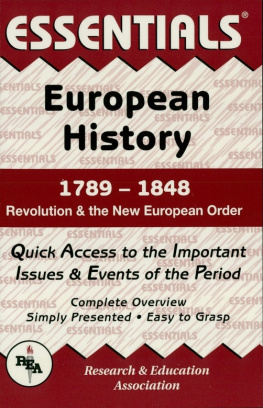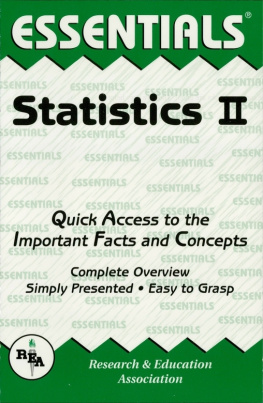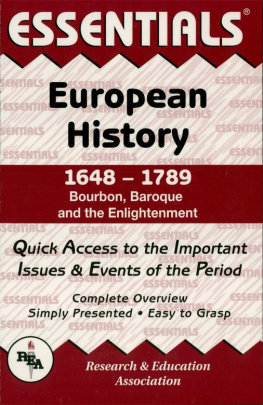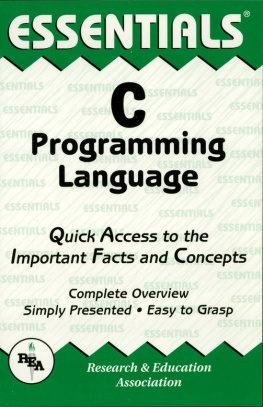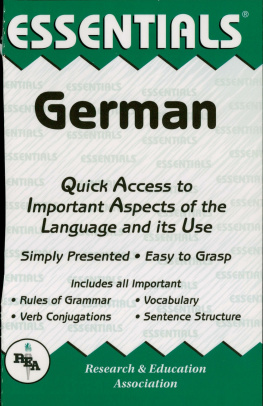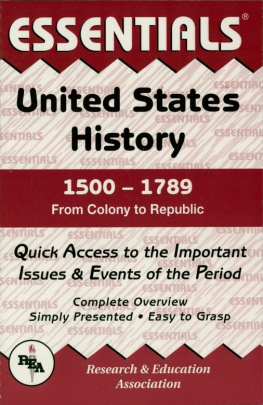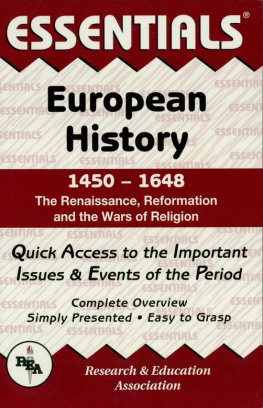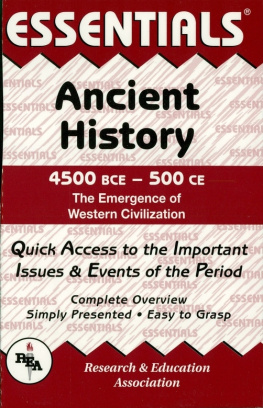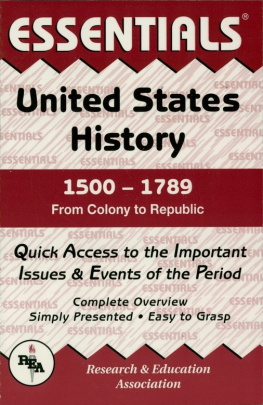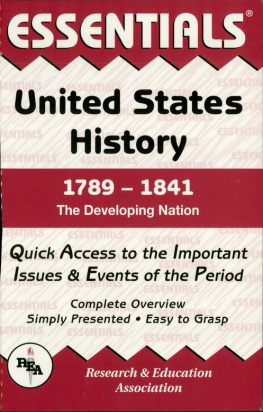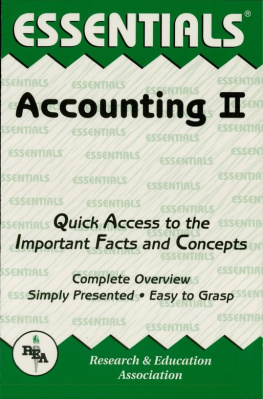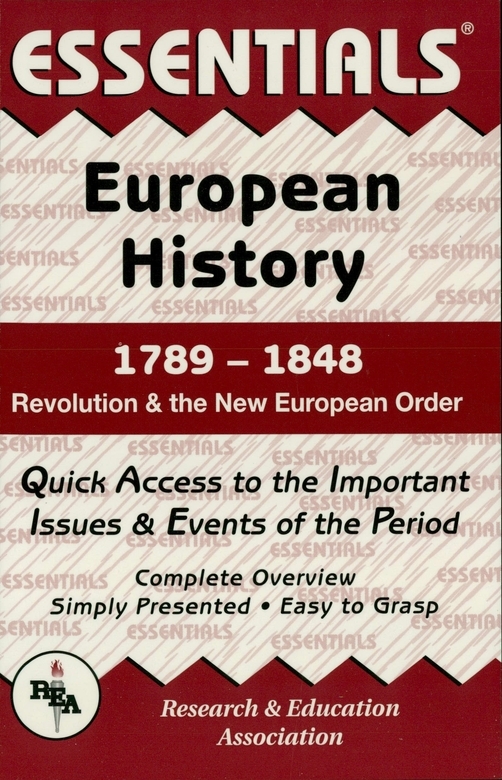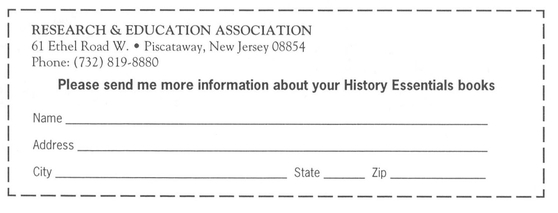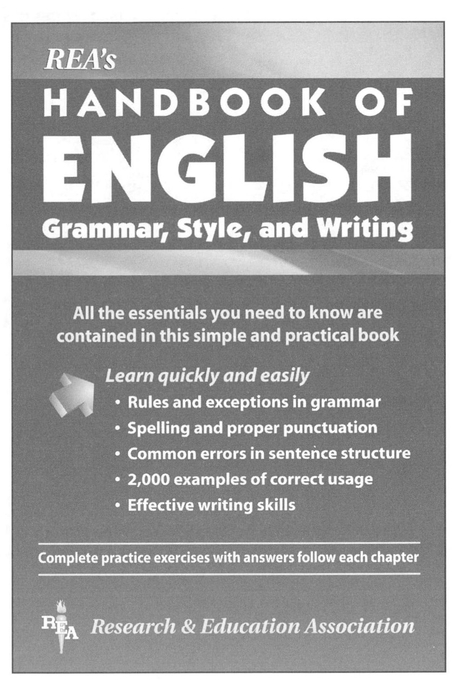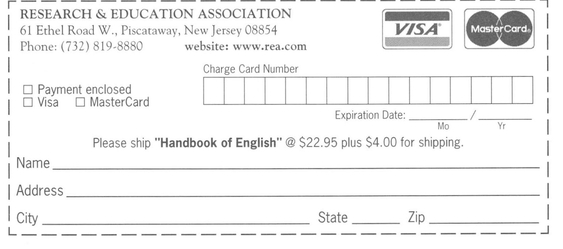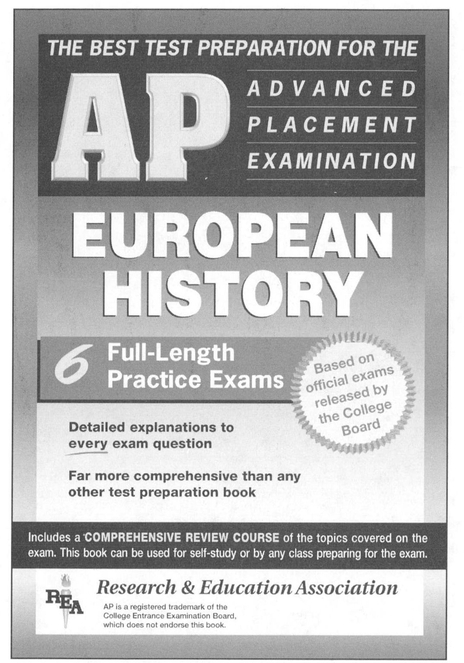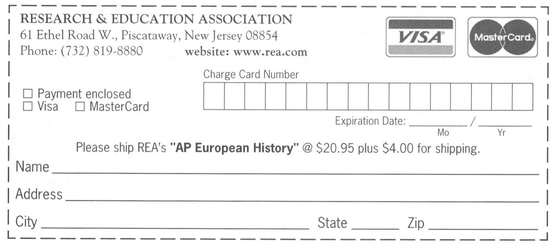About the Author
John W. Barrett is currently professor and chairperson of the undergraduate department of social science at Mary-wood College in Scranton, Pennsylvania, where he has held numerous teaching posts since 1960. He holds a bachelors degree in history and English, a masters degree in history and political science, and a Ph.D. in history and international diplomacy from Georgetown University. Further graduate study in history and interdisciplinary social sciences was completed at various colleges and universities. Additionally, he received his public school administrative certification from Lehigh University.
Dr. Barrett maintains memberships in numerous professional organizations and national honor fraternities. He has been listed in Directory of American Scholars, Community Leaders of America, and Outstanding Leaders of America.
The ESSENTIALS of HISTORY
REAs Essentials of History series offers a new approach to the study of history that is different from what has been available previously. Compared with conventional history outlines, the Essentials of History offer far more detail, with fuller explanations and interpretations of historical events and developments. Compared with voluminous historical tomes and textbooks, the Essentials of History offer a far more concise, less ponderous overview of each of the periods they cover.
The Essentials of History provide quick access to needed information, and will serve as handy reference sources at all times. The Essentials of History are prepared with REAs customary concern for high professional quality and student needs.
| UNITED STATES HISTORY | EUROPEAN HISTORY |
| 1500 to 1789 | From Colony to Republic | 1450 to 1648 | The Renaissance, Reformation & Wars of Religion |
| 1789 to 1841 | The Developing Nation |
| 1841 to 1877 | Westward Expansion & the Civil War | 1648 to 1789 | Bourbon, Baroque & the Enlightenment |
| 1877 to 1912 | Industrialism, Foreign Expan sion & the Progressive Era | 1789 to 1848 | Revolution & the New European Order |
| 1912 to 1941 | World War I, the Depression & the New Deal | 1848 to 1914 | Realism & Materialism |
| 1914 to 1935 | World War I & Europe in Crisis |
| America since | 1941: Emergence as a World Power | Europe since | 1935: From World War II to the Demise of Communism |
| WORLD HISTORY | CANADIAN HISTORY |
| Ancient History (4500 BC to AD 500) | Pre-Colonization to 1867 |
| The Emergence of Western Civilization | The Beginning of a Nation |
| Medieval History (AD 500 to 1450) | 1867 to Present |
| The Middle Ages | The Post-Confederate Nation |
If you would like more information about any of these books,
complete the coupon below and return it to us or visit your local bookstore.
Available at your local bookstore or order directly from us by sending in coupon below.
Available at your local bookstore or order directly from us by sending in coupon below.
These Little Books have rescued lots
of grades and more!
(a sample of the hundreds of letters REA receives each year)
Your Essentials books are great! They are very helpful, and have upped my grade in every class. Thank you for such a great product.
Student, Seattle, WA
I recently purchased six titles from your history Essentials series and I find them to be excellent.
Student, Dublin, Ireland
Thank you for volumes I & II of The Essentials of Statistics. I am very pleased with these two little booklets.
Student, Portland, OR
The Essentials book always comes to the rescue.
Student, Norwood, MA
Ive had the pleasure of using your Essentials of Physics study guide books, and have found them to be very helpful.
Student, Minneapolis, MN
(More on front cover)
CHAPTER 1
THE FRENCH REVOLUTION I, 1789 - 1799
The shape of the modern world first became visible during ten years of upheaval in France between the years 1789 and 1799. Radical ideas about society and government were developed during the 18th century in response to the success of the scientific and intellectual revolutions of the preceding two centuries. Armed with new scientific knowledge of the physical universe as well as a new view of the human capacity to detect truth, social critics assailed the existing modes of thought governing political, social, religious and economic life.
Thus the modern world that came of age in the 18th century was characterized by rapid, revolutionary changes which paved the way for economic modernization and political centralization throughout Europe. The ideas and institutions created by the revolutionaries would be perpetuated and extended by Napoleon Bonaparte, who conquered and converted Europe.
1.1 IMPACT OF THE SCIENTIFIC REVOLUTION (c. 1500 - 1700)
The Scientific Revolution revolutionized human thinking about the physical universe and themselves by producing a body of independent, scientific knowledge based on new measuring devices and new methods of observation and interpretation. This knowledge suggested that humans would understand the operation of the physical world through use of their reason, aided by the modern scientific method of inquiry.
The scientific method involved identifying a problem or question, forming a hypothesis (unproven theory), making observations, conducting experiments, interpreting results with mathematics and drawing conclusions.
1.1.1 Pioneers
Nicolaus Copernicus (1473 - 1543) rejected the geocentric (earth-centered) view of universe and suggested a heliocentric (sun-centered) view of the universe and thus began the tradition of modern scientific thinking.
Galileo Galilei (1564 - 1642) developed a powerful telescope and confirmed Copernicus theories.
Tycho Brahe (1546 - 1601) is considered the greatest astronomer of the late 16th century. Having built one of the earliest modern observatories, he kept meticulous celestial observations.
Johannes Kepler (1571 - 1630) used Brahes observations to prove that a mathematical order existed in the planetary system; he proved mathematically that the planets revolve around the sun.
Isaac Newton (1642 - 1727) discovered the laws of motion, gravity and inertia. By building on earlier discoveries he developed a systematic interpretation of the operation of the universe (Newtonian View of the Universe), wherein natural scientific laws all worked together to provide a clear and comprehensive explanation of the physical universe. After Newton, the scientific method was not a matter of theory or observation, but both. Little wonder then that the poet Alexander Pope could write: Nature and natures laws lay hid in the night; God said, Let Newton be! and all was light.

